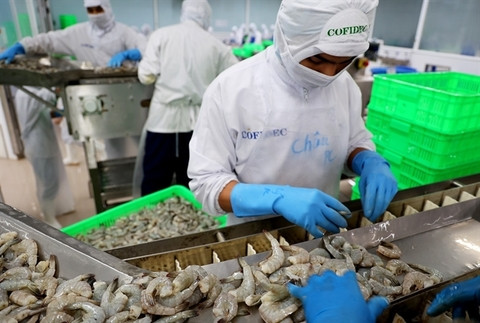
Shrimp processed for export. The Ministry of Industry and Trade urges close watch on global market developments to take appropriate domestic price management policies. — VNA/VNS Photo Hồng Đạt
The global economic and socio-political situation was forecast to continue being complicated and unpredictable, the ministry said, adding that strategic competition among major economies was increasingly fierce with rising uncertainty, slow economic recovery, energy crisis and disruption of supply chains.
Especially, new challenges in terms of global food security have emerged.
The instability and uncertainty of the global economy were at the highest level in many years, significantly affecting the macroeconomic stability and growth prospects of Việt Nam, given the economy’s openness and the dependence of recovery on the diversification of export markets, ability to take opportunities from free trade agreements and handle risks arising from trade and technology competition among major economies.
International policies, including the global minimum tax and the EU’s regulations on the import of forestry and fishery products, would also have strong impacts on Việt Nam’s economic recovery.
The ministry said the global economy was entering a new era, full of risks and challenges. The risks of economic recession, inflation and high rates caused a sharp drop in consumer demand in countries around the world, including the EU and the US, which were large trade partners of Việt Nam.
Developed economies were paying greater attention to consumer safety issues while sustainable development and climate change adaptation would be the premise for these countries to erect new barriers to supply chains, raw material supply, labour and environment for import products.
There was also a trend of moving supply sources closer to the consumption market to minimise the risk of disruption, clearly shown through the effort of diversifying supply sources of Việt Nam’s major export markets, the ministry said.
It pointed out that multinational corporations were implementing the strategy of near sourcing and diversifying supply chains instead of focusing on some countries such as China and Việt Nam.
In the domestic market, the consumer price index remained high compared to previous years. The increase in base salary from the beginning of this month has increased demand but might cause negative impacts on enterprises and employees, especially the increase in the domestic price level.
The price management would continue to face many difficulties with increasing inflationary pressure and the risk from the increase in prices of strategic commodities in the global market, weighing on input costs, the ministry said, urging close watch on supply and demand and global market developments for appropriate solutions.
The ministry also pointed out that there were opportunities for Việt Nam’s economic growth, which would come from the Government’s effort to speed up the disbursement of public investment in the remaining months of this year, support policies to production and business in terms of tax and fee and lowering rates.
In addition, the free trade agreements (FTAs) would also positively impact trade, investment, and especially the exports of Việt Nam.
The ministry’s statistics showed that Việt Nam ran a trade surplus of more than $15 billion in the first seven months of this year, more than 11 times higher than the same period last year.
The ministry said that it was because Việt Nam’s import of raw materials dropped strongly on global economic difficulty, which caused falls in export orders.
Latest updates of the General Department of Customs showed that Việt Nam’s trade surplus in January – July amounted to $16.48 billion, 12 times higher than the same period last year.
Specifically, Việt Nam’s total import and export value was estimated at $374.36 billion in the period, falling by 13.8 per cent. Export value reached $195.42 billion, 10.3 per cent lower, while import value was $178.94 billion, down 17.4 per cent. — VNS